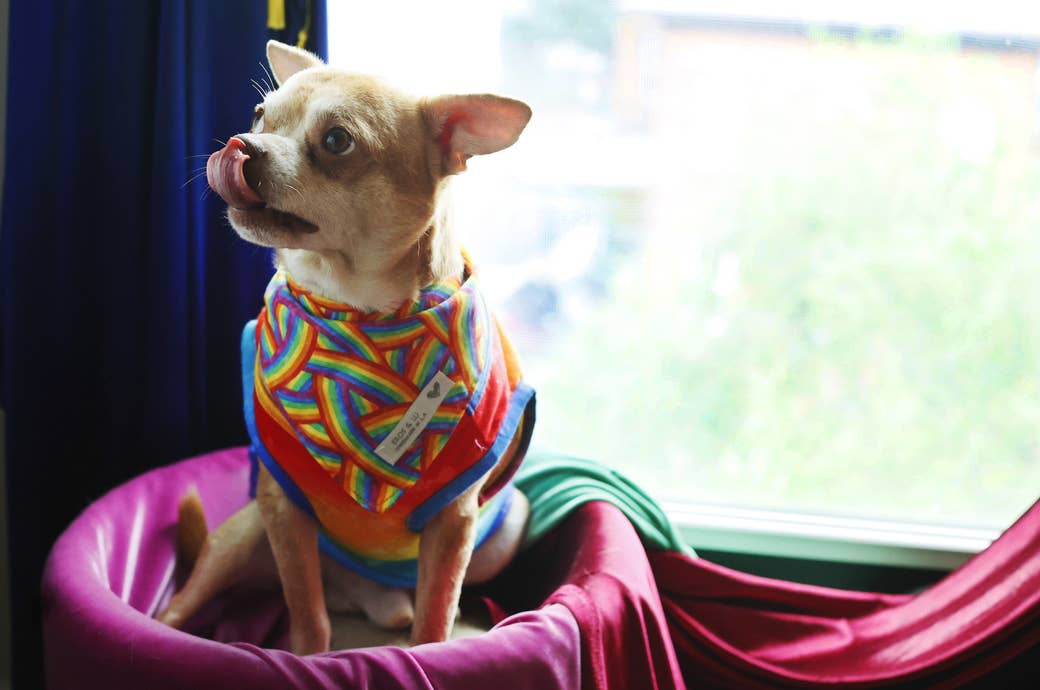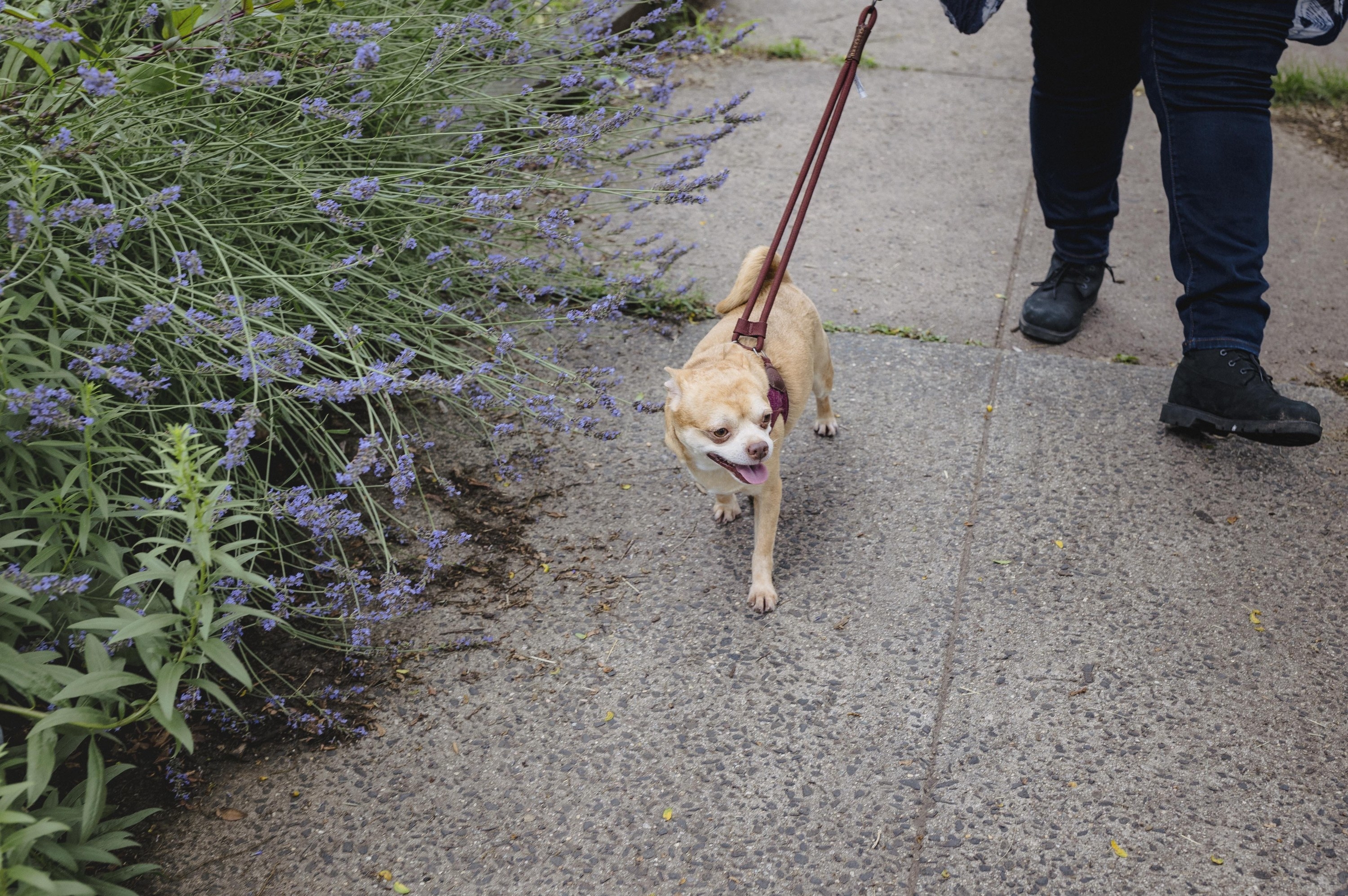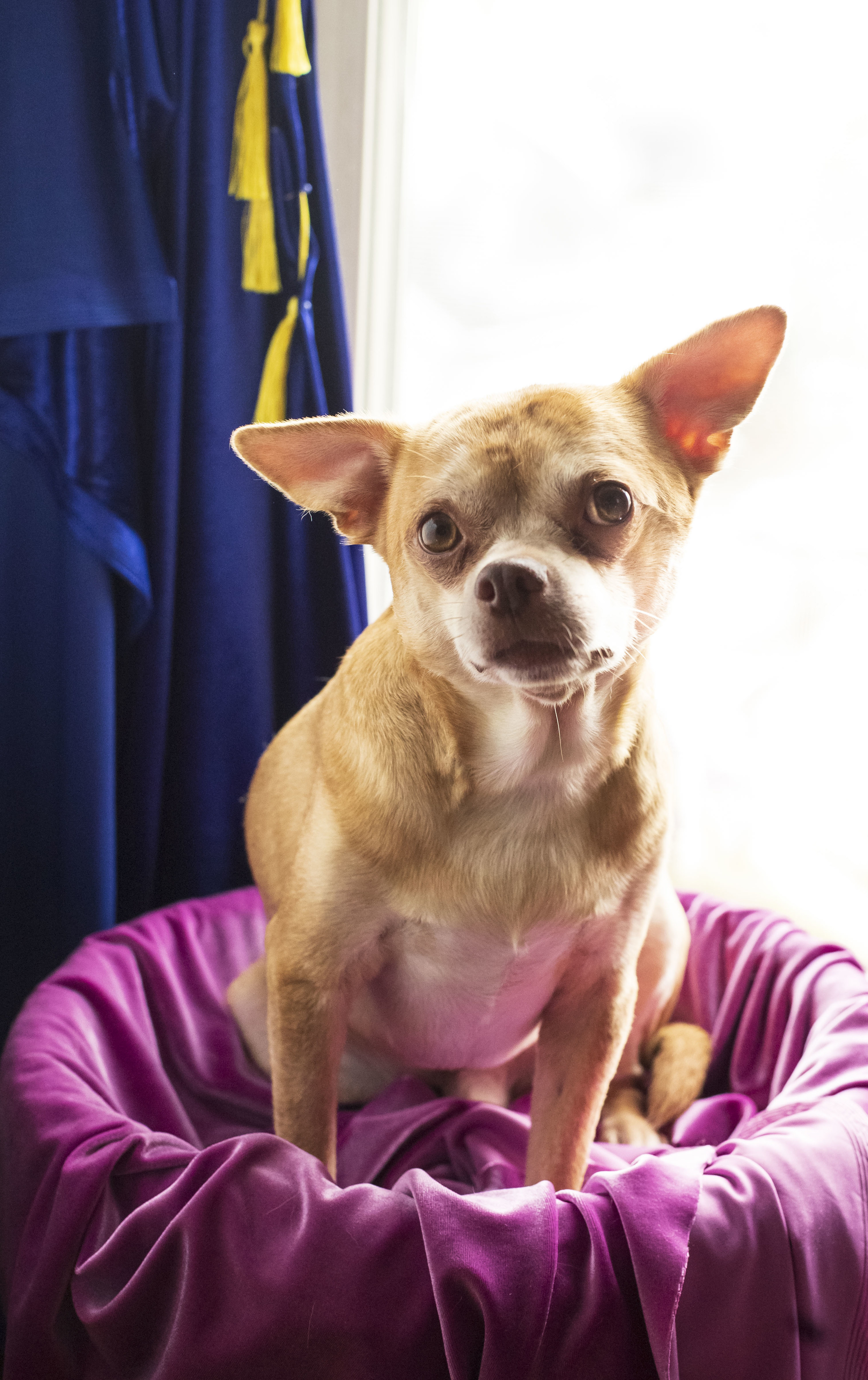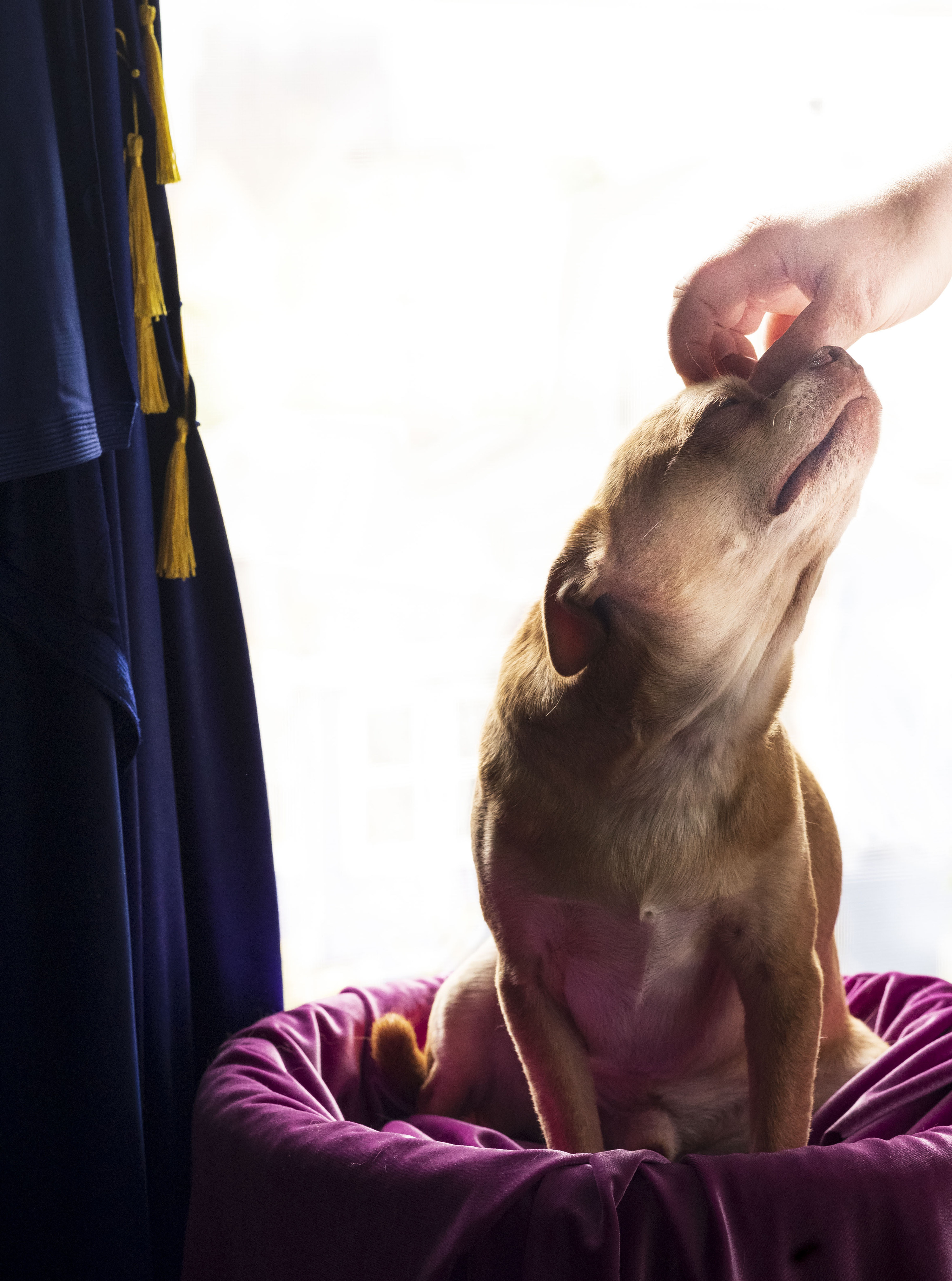
NEW HAVEN, Connecticut — Fame has not changed Prancer the Chihuahua, a 13-pound furball of stress.
The 2½-year-old went viral in April after his foster mom wrote a Facebook post begging for someone to adopt him despite knowing there was not a market “for neurotic, man-hating, animal-hating, children-hating dogs that look like gremlins.”
Months later, Prancer remains a neurotic, man-hating, animal-hating, children-hating dog that looks like a gremlin. The difference is that now he has found his forever person who loves him anyway.
“There's some times where I look at him like, You're the most beautiful dog I've ever seen,” Prancer’s new owner, Ariel Davis, told BuzzFeed News. “And then there's some times I'm like, What hole did you crawl out of? You are the biggest baloney.”
BuzzFeed News went to visit Davis in New Haven, Connecticut, to meet the dog described as “a haunted Victorian child in the body of a small dog” and to see how the pair were settling into life together. After a huge increase in pandemic dog adoptions, some shelters are now seeing an increase in dogs being returned as people head back to offices or suffer financial difficulties. Additionally, many new pets are struggling to cope with being left alone for the first time after spending quarantine with their humans 24/7. So how is a dog that already had major behavioral issues handling his new home?

“Just ignore him,” said Davis when BuzzFeed News first approached. With a rainbow bandana tied around his neck, Prancer was busy sniffing the street and peeing on trees. As we walked around the block together, a fluffy black dog filled the sidewalk and Prancer lost his cool, barking and freaking out. Distraction was key, and Davis gave him treats and squeezed a squeaky toy so Prancer would look at her, not the other dog. “You see a little bit of demon dog,” said Davis.
Then two men started walking toward us, but Davis was ready. She pulled Prancer off the path, positioned herself in front of the dog, and squatted down next to him, patting him and giving him treats. Prancer never even noticed the men were there.
“Part of my job with him is teaching him to just exist around other people without having to freak out,” said Davis.

As Davis points out, Prancer’s behavior makes sense, really. His first owner — a single, older woman who’d spoiled him with bacon, egg, and cheese sandwiches and cashmere sweaters — moved into an assisted living home and he was sent to a rescue.
A foster home took him in, where Prancer was put on a strict diet (to remove those quarantine pounds), had to live with a man (despite hating men), and was competing for affection with seven dogs and 12 cats (instead of living life as a beloved only child).
“He went from being an only child to being in a place where he was uncomfortable,” said Davis.
And so Prancer acted out.
Davis compares Prancer to the pandemic babies and small children who became used to spending all their time cooped up at home with only their parents. “And now they have to go out into a world where they're not used to people, much like Prancer,” she said. “It's really just about finding somebody that helps you be comfortable, and finding ways for you to be comfortable in that environment.”
Enter Davis, a single lesbian in recovery from a marijuana addiction who was desperate for a companion. The 36-year-old takes her role as Prancer’s owner as seriously as she does her job as a cook working in the kitchen at the rehabilitation center for women that she attended herself.
On the day of their first meeting, she brought Prancer a plate of the breakfast she’d cooked for the women in the facility: bacon, eggs, sausage, French toast. Prancer ate all of it.
While Prancer needed a second chance, he, too, is a second chance for Davis, an opportunity for redemption. When she filled out her adoption application, Davis spoke of a bond she sensed with another creature that had also gone through tough times. “I was brought to tears due to the intense connection I felt when reading about Prancer’s story,” she wrote.
Three years ago, she had to rehome her two dogs, Doodle and Blue, when she entered rehab (the dogs are now safe and happy, Davis said). Doodle was also poorly behaved, but that was Davis’s fault. “Most of his problems were learned behavior from my life,” she said. She didn’t have the patience for them. Once, when Blue was barking and she couldn’t figure out why, a friend suggested that maybe he just wanted a pat. It had never occurred to her.
But adopting a famous dog brought a huge level of attention she’d never expected, particularly because Davis usually has a quiet life: She works, she comes home to Prancer, she spends hours every day writing fantasy and playing World of Warcraft.
The original publicity around Prancer’s adoption brought a huge amount of stress. Social media became impossible; she’d log in to Facebook and see hateful comments. “There was a point where I could not log in because there’d be a story about me and Prancer and there'd be 12,000 comments: Why have you given this dog to a drug addict? What happens if she relapses? What's going to happen to the dog? This girl has already given away two other dogs. What's gonna stop her from giving away this dog? Oh, a lesbian, she probably is three months late on rent and drives around in a pickup truck,” said Davis. “And I'm like, actually, her rent is current and I have a new Honda Civic — it’s great.”
All the press forced Davis to focus more intently on her recovery. She got closer with her sponsor, attended more AA meetings, and connected more with the other women in rehab. Now she has a book agent for a possible children’s book about Prancer, and film producers have talked to her about adapting his story, both ideas that she is hopeful will come to fruition. She also hopes to publish her own writing one day.

For all Prancer’s complaining when someone makes a sudden movement near him, he is a natural performer for the camera. Pout, smirk, smile, side-eye, ears up, paws down — he moves through poses like a canine Kendall Jenner.
But managing a dogfluencer is Davis’s personal idea of hell, even if she laughed when Petco sent a Nightmare Before Christmas collar, a stuffed monster toy, and bacon, egg, and cheese–flavored snacks. She did a recent Instagram advertisement for a vacuum cleaner, a product she truly liked, but the anxiety over getting the post right meant a “very dark” week of really difficult mental health. She swears she won’t do advertising again, even though her inbox is full of requests.
“The fame had a darker end of it, but the light at the end of the tunnel? It was Prancer,” said Davis. “What pulled me out was him.”
Prancer adores Davis, regularly trotting over to her for kisses and pats. Anytime he’s acting out, it’s because he’s trying to protect her. With her past dogs, Davis didn’t know to stay calm. “I was barking at him and he was barking at me, and we were all just barking at each other,” said Davis.
But with Prancer, “when he barks, I'm like” — at this point Davis started cooing in a baby voice — “‘What’s wrong, Prancer? What are you doing?’ And then he's like, Why am I barking? and starts wagging his tail.”
While Davis helps Prancer be braver with every treat, he forces her to take care of herself. After a difficult year — for a dog, for a woman in recovery, for an entire country — the pair found each other and discovered peace.
“I took care of myself. I took care of my situation,” she said. “Now I'm able to take care of a dog, and good things are coming to me.” ●


